The History of Roanoke Academy
No better way to learn the history of something than from someone who truly knows it. (This appeared in the Fourth Book of Unexpected Enlightenment, The Awful Truth About Forgetting, as Chapter 16.)
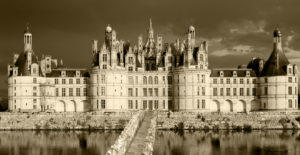
The Mysteries of Roanoke Island
After lunch, the remaining students gathered in the theater in Dare Hall to watch a magic lantern show. The theater was a cavernous chamber with red velvet chairs, the bottoms of which folded up to allow people to file through the aisles. A curtain of gold velvet hid the stage. In front of the curtain hung a huge white screen. Next to it sat a chair.
The narrator for the event was Rachel’s language tutor, Hieronymus Tuck, a heavyset man with brown hair and beard. He walked ponderously onto the stage, his customary green and black robes swishing about his legs. With him were his two tiny children, a boy and a girl of about two and four respectively. Mr. Tuck crossed the stage to the seat beside the screen. For every step he took, the little ones took three running steps to keep up with their giant of a father. They gazed up at him with such adoring looks that Rachel had no doubt why Mr. Tuck had allowed them to accompany him.
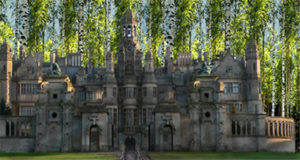
Dare Hall
“Good afternoon, all,” Mr. Tuck rumbled, upon reaching the side of the screen. The enchantments woven into the theater amplified his voice. Behind him, his children climbed into the chair that had, presumably, been meant for him. “And welcome to our yearly Thanksgiving Day magic lantern extravaganza. In honor of this holiday, celebrating one group of persecuted settlers who came to the shores of America, we shall present the story of a different group of persecuted settlers, one whose journey touches more closely upon all of you than does that of the Pilgrims. Even if the Pilgrims are responsible, albeit indirectly, for the delicious, delicious tradition we shall enact later this afternoon of stuffing ourselves on turkey and pumpkin pie.
“The official name of this presentation is the History of Roanoke Island,” Mr. Tuck continued, “But I like to call it the Mysteries of Roanoke Island. Mysteries are so much more interesting than histories, are they not?
“Now, you may wonder why I, a canticler, am narrating this presentation instead of a tutor from the History Department. This is the first of the mysteries. It shall be answered anon.”
Without further ado, Mr. Tuck launched into the magic lantern show. A black and gold box in the middle of the chamber issued a light that projected hand-painted slides onto the screen. Some of the slides were colorful. Others were simple silhouettes.
“Our story,” announced Mr. Tuck, in his deep booming voice, “begins when the sorceress queen herself, Elizabeth the First, granted Sir Walter Raleigh—after whom Raleigh Hall is named—a charter to found a colony in the newly discovered lands that were, at that time, called Virginia, in honor of Elizabeth, the Virgin Queen.
“Actually, Queen Elizabeth originally gave the charter to Sir Humphrey Gilbert, Raleigh’s half-brother. But Sir Humphrey drowned in an ill-fated attempt to found a settlement in what is now Canada. So, Sir Walter took up the cause.
“Raleigh organized an expedition that arrived on Roanoke Island—which was at that time a normal island off the coast of what we now call North Carolina—on July fourth, fifteen eighty five. The expedition established a small settlement and built a real wooden fortress. Raleigh himself, incidentally, did not accompany the expedition. He was the queen’s ambassador to the City of the Wise known as El Dorado. But I digress.

The Rune Oak — or Roanoke Tree, with its seven branches, each of a different kind of tree.
“Incidentally, their new home was originally called Rune Oak Island. Only later did the story spread that the name came from the Algonquin word for ‘money.’
“Two years later, on August eighteenth of fifteen eighty seven, the colonists witnessed the arrival of the first English child to be born in America, our founder and benefactress, Virginia Dare—after whom which dormitory was named?” Mr. Tuck gestured encouragingly toward the audience with both hands.
The crowd roared back, “Dare Hall!”
Mr. Tuck smiled and nodded. Stroking his beard with his hand, he gestured for the next slide, which showed a ship at sea.
“A year later,” he continued, “the next ship from England found the settlement abandoned. To this day, the fate of these settlers remains a mystery to the Unwary.
“We of the Wise know what became of them. But we have a different mystery in relation to these settlers, as we shall soon see. What we do know, that the Unwary do not, is that many of those who volunteered for the journey were members of the Wise, who were fleeing persecution, and in fifteen eighty eight, news arrived that their persecutors were about to catch up with them.
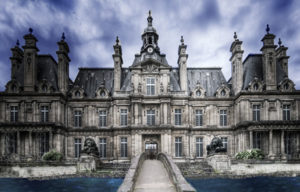
Drake Hall and its moat
“But, to continue my narrative: In fifteen eighty five, the Tiger, a ship coming from England, was separated from the rest of its fleet by a severe storm and ended up in Puerto Rico. There, they came in contact with the Spanish before continuing on to Roanoke Island. In fifteen eighty six, another great sorcerer, Sir Francis Drake—after whom was named…” He cupped one hand to his ear and gestured toward the crowd with the other.
The students shouted: “Drake Hall!”
“Sir Francis,” Mr. Tuck continued, gesturing at the screen, which now showed the acclaimed sea captain and sorcerer with his high, stiff, white lace, Elizabethan collar, “stopped by Roanoke after a successful raid in the Caribbean. He warned the settlers he had received word that the Spanish in Puerto Rico had alerted their enemies to their position. Rumor had it that a fleet had been dispatched to destroy them.
“The settlers were quite dismayed. They had fled to a new continent, leaving behind house and home, and now their persecutors had found them again. One member, however, Ananias Dare, befriended a medicine man of the Croatan peoples named Achakahanu or Spirit Who Laughs. Laughing Spirit, as he came to be called, taught the newcomers the secret of uprooting an island. This was something that his people did occasionally, so as to move an island to better fishing grounds.
“Our settlers worked together with Laughing Spirit to weave a great enchantment. They uprooted Roanoke Island permanently, making it into a floating island. Before they left, they built a ramshackle version of their settlement on a nearby island; however, they did not bother to rebuild the fortress.
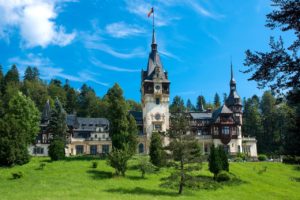
The Lower School
“This is why, when John White, the governor of Roanoke and the grandfather of Virginia Dare, returned from England in fifteen eighty eight, he found the town but not the fortress, which he reported had been dismantled. The ruins of the fortress, by the way, are still visible on our island, just north of the Lower School, to the south of our current position.
“But to continue, Laughing Spirit went on to marry our heroine, Virginia Dare, and to aid her, in sixteen twenty four, in the founding of what today we call Roanoke Academy, though originally it was just known as the College at Roanoke. He took the last name of Dare, which is why Virginia’s descendants are still Dares today—including our own Jenny Dare. Is she here?”
Jenny Dare, a huge smile on her face, rose from her chair and waved. Her exuberance caused her straight brown hair to bounce around her head and shoulders.
Mr. Tuck gestured toward her. “Including Jenny and her brother Thomas, whom some of you may remember. He graduated—three years ago, I believe?
“To continue, Roanoke was now a floating island. But I promised you a mystery. What we of the Wise still do not know today is: from whom were these settlers fleeing? This should be a simple historical matter. These events were not so very long ago, as the Wise count years…and yet, we can find no definitive record as to who was doing the persecuting.
“Some records suggest that the goddess Hecate was offended that these folks strayed into areas of magic she had forbidden to mortals. Others claim that they were secretly worshippers of Orpheus, who made many enemies among the immortals. Still others say that it was Dionysus whom they had offended.
“Based on a few symbols the persecutors left behind, some historians of the Wise believe the settlers were pursued by the followers of Thor or of Indra. These claims, however, are not confirmed by any of the known activities of these peoples at the time.
“And so, students, we have a mystery.” Mr. Tuck spread his hands. “How it could be that the Wise, who keep such scrupulous records—going back to the Age of Stone, when humans lived in caves and still drew pictures on walls—could have lost this crucial piece of information?” He shrugged his large shoulders. “No one knows.”
“Pressing on.” He gestured. The next slide showed the leaning tower of Pisa. “Leaving the Americas, the floating island began to travel with the current. But this is a different matter for the Wise, to whom winds and currents bow, than it is for the Unwary. So our ancestors had some control over where Roanoke wandered.
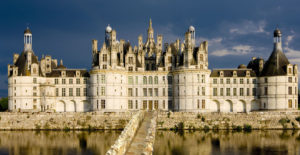
Roanoke Castle — now know as Roanoke Hall, with the bridge over the reflecting lake.
“Within a quarter of a century, the island had reached the Italian peninsula. There, Virginia Dare commissioned Leonardo Da Vinci to design Roanoke Hall, which was then called Roanoke Castle. Mundane records claim Mr. Da Vinci died over a hundred years before Roanoke’s arrival. But we of the Wise know that the venerable alchemist lived to the ripe old age of two hundred and three.
“After that, the island traveled around the world, often taking a few decades to complete each circuit. Enchanters used their mastery of weather to influence which way the island drifted and to keep it from growing too warm or cold. Originally, the college at Roanoke only taught Enchantment and basic Enochean warding. They relied on mist and fog to keep them hidden in those days, not yet having the advantage of Obscuration. As they traveled and made new contacts, however, new branches of study were opened.”
The screen displayed a black-and-white etching of an island surrounded by mist with a huge tree with seven branches rising from the center of the island, the same tree that Rachel and Sigfried had so recently seen laying fallen at Dutchman’s Cove.
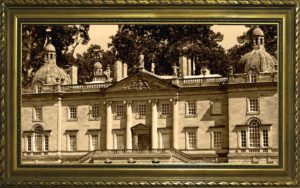
Dee Hall
“In sixteen thirty seven, the island traveled to England, where John White was reunited with his daughter, Eleanor White Dare and where he met for the first time his now-grown granddaughter, Virginia. While there, the island was visited by the aged sorcerer extraordinaire, John Dee, who had retired from public life years before—upon a day that the Unwary still take to be the date of his death. Mr. Dee bequeathed his books to the college, and Dee Hall was built to house them. Does anyone know what Art was originally the focus of Dee Hall?”
Students raised their hands, calling out answers as Mr. Tuck pointed at them.
“Divination?”
“Scholarly pursuit of pure wisdom?”
“Omen readings?
“No, those are the modern studies associated with Dee Hall, but what was the original purpose? Hmm? Anyone?”
Rachel raised her hand. During the period of her life when she had kept a picture of Dee Hall hidden under her bed and dreamed of living in the dorm whose hallways were lined with books, she had read everything she could about the fascinating building. The memory of her love for Dee Hall and how the opportunity to live there had been denied to her still caused a lump in her throat.
Alas, Mr. Tuck did not call on her.
“Augustus Dee, I see you in the crowd,” boomed her language tutor. “You are an actual descendant of the great John Dee. Are you not?”
The young man, a round-faced college student wearing glasses, rose to his feet.
“I am!” he yelled back cheerfully, “for all the good it does me.”
That earned him a laugh.
“What was the Art originally studied at the hall named for your illustrious ancestor?”
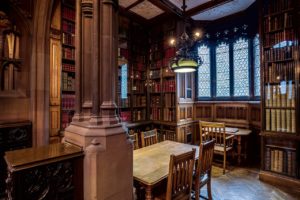
A room in the Roanoke Library
“Theurgy,” Augustus Dee answered smartly.
“Which means—?” Mr. Tuck pressed.
“The practice of rituals intended for the purpose of invoking the gods.”
“And why, pray tell, Mr. Dee, is that Art no longer the centerpiece of Dee Hall today?”
Augustus Dee stood straighter, “Because the gods no longer come. Elves come. Star fairies sometimes come. Chthonic monstrosities still come. But gods? Even demi-gods? No one has seen one in generations, not counting Rory Wednesday, of course.”
The crowd burst out laughing. Rachel looked around the theater but saw no sign of the extraordinarily beautiful upperclassman who was rumored to be descended from Odin.
“I mean no disrespect to the priests and monks and all,” added Augustus Dee. “I am sure that the gods still watch over us and come among us in secret. But, in the old days, they used to appear to us in the open quite regularly.”
“And when, Mr. Dee, was the last verified sighting of a god or goddess by mortal eyes?” asked Mr. Tuck.
Augustus replied with a big grin, “At the groundbreaking ceremony of Dee Hall. Athena walked upon the earth of this island and gave the hall her blessing. She has not been seen since.”
Mr. Tuck gestured toward the screen, which showed a silhouette of the goddess of wisdom with an owl sitting on her shoulder. “Very good. Does anyone here know why that is?”
No hands rose.
“Anyone?” Mr. Tuck looked around hopefully. “Me, neither. And in that, we have yet another mystery. Why have the gods abandoned us? Or at least, no longer visit us openly?”
Rachel did not raise her hand, but she recalled a cryptic comment made by Cassandra March, the wife of the Grand Inquisitor, when they had met her in dreamland: No real gods or angels are allowed on this world. Why was that? Was it because of this rule that the Raven had tried to keep them from speaking to the Lion? If so, who had made the rule? The Raven? If that were the case, why had he then declared that she had done something very, very right?
It was almost as if she had been disobeying an ordinance that he was honor-bound to enforce but with which he disagreed. But, if the Raven had not established the rule, who could have done so? Whom did the Raven obey?
Upon the stage, Mr. Tuck continued, “After that, Roanoke visited many distant lands. Our sorcerers would meet with their sorcerers. Occasionally, for different reasons, some foreign practitioners of the Sorcerous Arts would ask or agree to move to the island and teach.
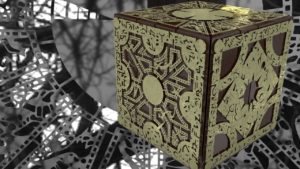
Chinese Alchemical Puzzle Box
“From China came our first alchemists in the early seventeen hundreds. From India came the Art of Obscuration, hypnotism, and a whole Pandora’s Box of similar disturbing powers. From Prester John’s Kingdom, deep in Abyssinia, came wise men who recalled the Original Language once spoken in Sumeria, before the curse of tongues robbed men of the Gift of Moira.
“From Prussia came thaumaturges, those who could weave together the powers of the other Arts into potent spells. From Australia and New Zealand, shamans who knew the ways of the Long-Ago Dreamtime and could draw gifts from the sky—what we call Conjuring. From many tribesmen on various continents came taboos that have been added to the Enochean Arts—the Art of Warding said to have been established by an ancient sage named Enoch. Enoch is said to have built the first city. Or perhaps it was the first city wall. Accounts differ.”
Slides went by showing ornate Mandarins surrounded by Chinese water dragons—who looked much like Lucky; elegant Rajas atop war elephants; silhouetted Ethiopians holding conversation with the brooks and trees; German scholars bent over great tomes; and Aborigines pulling balls and snakes from mid-air.
Rachel wondered if the aborigines were from Australia or Magical Australia. Did Magical Australia have aborigines? She knew they had emus and wombats and kookaburras, but Nastasia had not said much about the people her father ruled.
“As Roanoke Island traveled from place to place,” Mr. Tuck continued, “sorcerers from different countries, different continents even, began to meet, to speak, to swap knowledge and expertise. The idea began to germinate that perhaps there should be some kind of community, a council that could handle problems and decide disagreements.
“Thus was born the Parliament of the Wise. It was not a parliament at first. That came about fifty years later, in the seventeen forties. Though the Charter was revised again in seventeen ninety two to reflect some of the wisdom of the American experiment—as it was known at the time.
“Oh, and Roanoke was right here in America during the Revolution, fighting side by side with their fellow colonists, despite our strong ties to England. Several of the founding fathers were educated here on the island. Most notably, the great alchemist Benjamin Franklin, whose works we continue to study today. Other members of the founding fathers who studied…” Mr. Tuck waved a hand. “But I digress again.

Machu Picchu — Unwary view (or llama view)
“As time went on, members of the Wise began to chafe at having a government seat whose location could not be predicted. So, in eighteen twenty four the government left Roanoke Island. First it met in London. Then, for several decades, it moved every few years, from Vienna to Johannesburg to Verhängnisburg to Kyoto to Thulhavn and finally , where it resided for over a decade. But it was eventually agreed that this inland, mountainous location was too remote—travel glasses not being as prevalent as they are now. So, in eighteen fifty two, the Parliament of the Wise settled permanently in its current location, in the Republic of Cathay—which, as the Wise-born among you know, is south of China but north of Vietnam.
“After the Parliament of the Wise departed the island, those who stayed behind reorganized, forming Roanoke Academy for the Sorcerous Arts. The College at Roanoke was divided into the current college and the Upper School. The Lower School was built four decades later, in eighteen sixty four, before that older and younger children had been educated together.”
Mr. Tuck gestured to the screen. Images flashed by showing Roanoke Hall, the seven dormitories and the Tudor-style castle of the Lower School, with its tall round spires.
“Now, finally, we come to the very first mystery I mentioned: why I, and not Mr. Gideon or Mr. Sanchez or one of the other Scholars, am speaking to you today. For the two hundredth and fiftieth anniversary of the founding of the college at Roanoke, the island returned to England. During this visit a very important event occurred. Can you guess what it was?” Mr. Tuck leaned forward, his eyes twinkling. “Anybody?” He looked back and forth, squinting at an arm that was raised in the dark auditorium. “No comments from those of you who have heard me give this speech before.
“No? I shall tell you. It was in this year, eighteen sixty four, that my great-grandfather, Onesimus Tuck, joined the staff at Roanoke Academy.” He bowed toward the audience then gestured toward the screen. The slide showed a portrait of a portly bearded man dressed in the style of the early nineteenth century. “Yes, it is true. I am that rare bird, the native Roanokean.”
Applause briefly drowned him out. When it grew quiet again, Mr. Tuck continued, “My father taught here, as did his father, and his father before him—Onesimus Tuck himself. I grew up in the same cottage in the Staff Village where my children live today.”
He gestured at his little ones. The girl hid her face shyly, but the little boy leapt to his feet and stuck out his tongue at the audience, sparking laughter.
Mr. Tuck continued, “You may have heard that when the Terrible Five first came to Roanoke, they slew the school’s seven most potent sorcerers, hoping to scare the rest. My father was one of those seven. I was away that year, having already graduated. I was doing advanced studies in Mesopotamia. When I heard the news, I returned. I was one of only five people who came back to Roanoke, when so many were fleeing. I was here, twenty-five years ago, come May, for the Battle of Roanoke. I fought. I was wounded. I lived.
“A great many of my friends and two of my siblings were not so lucky.”
Mr. Tuck took off his mortarboard hat with its green tassel and held it against his chest, bowing his head out of respect for the deceased. There was a moment of silence. Rachel bowed her head, too, and silently repeated one of the traditional rhymes to quiet the uneasy dead.
Replacing his hat, Mr. Tuck boomed, “And now you know why it is that I like to be the one to give this talk—even though I am not a member of the History Department. This story, the story of Roanoke, is also my story.
“But this is not the end of our tale. One part remains: Coming to the Hudson Highlands. It is here that a name that many of you have heard of late, perhaps more than you might like, enters our narrative: the Heer of Dunderberg.
“Does anyone here know the origins of the Heer?” He looked back and forth across the crowd. “Anyone? Anyone?”
Rachel checked the many memorized books in her mental library. To her surprise, she did know the answer. She raised her hand.
“Ah. We have a hand. Miss…” Mr. Tuck shaded his eyes, as he stared into the dark auditorium, perhaps to block the glare of the magic lantern. “Miss Griffin?”
Rachel stood up and called, “The first Dutchman murdered in North America was John Colman, a sailor from Henry Hudson’s Half Moon. Colman was shot in the throat by a native arrow. Some believe that his uneasy spirit made a compact with dark powers, transforming him into the Heer. He was said to destroy ships because he was trying to scare the Europeans away, so they would stop coming to these lands, where he believed they will die.”
“Very good!” Mr. Tuck looked impressed. “And how did you acquire this bit of arcane knowledge?”
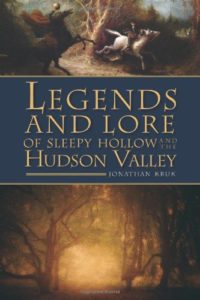 “It was in Legends and Lore of Sleepy Hollow and the Hudson Valley by Jonathan Kruk,” explained Rachel. “One of the books on display in the library before All Hallows’ Eve.”
“It was in Legends and Lore of Sleepy Hollow and the Hudson Valley by Jonathan Kruk,” explained Rachel. “One of the books on display in the library before All Hallows’ Eve.”
“I am impressed, Miss Griffin. I shall inform our librarian, Mr. Poole, that, occasionally, his library manages to trickle a bit of knowledge into the head of an actual student,” said Mr. Tuck. “Yes. Some believe that the Heer was once a man. Others believe he has always been a goblin, but Colman’s dying curse drew him here, which is why he dresses in the Dutch style.”
The next slide showed a fanciful depiction of the Heer, dressed in his green and gold Dutch doublets. He looked more like a wizened goblin than the young Dutch boy Rachel had seen.
“Either way, the Heer is a menace,” boomed Mr. Tuck. “And he has been a menace for centuries. Thanks to him, many ships were sunk at World’s End.” Mr. Tuck pointed to the south. The screen showed an image of an area of river south of Roanoke, just north of West Point. “Among them, a ship belonging to the notorious Captain Kidd.
“Eventually, the Heer got to be such a bother that locals appealed to the Parliament of the Wise for help. This was in the early twentieth century. The Parliament chose Roanoke to solve the problem. So, the island headed up the Hudson and moored itself to a small lump of land in the middle of the river known as Pollepel Island.
“Now, you may ask, why did they send Roanoke? While the Parliament of the Wise had departed just over seventy five years earlier, the Wisecraft still had offices on the island. They were housed in a Scottish-style castle that their leader Frances Bannerman, the Grand Inquisitor of the day—Is Molly here? Molly Bannerman? No? Well, no matter—had built on the southwest tip. The castle, incidentally, was constructed to guard the only permanent opening in the formidable wards of Roanoke Academy.
“If any of you had wondered why you must walk up the stairs and pass through the ruins of Bannerman’s Castle to reach the campus from the docks, yet another mystery has been solved for you today.
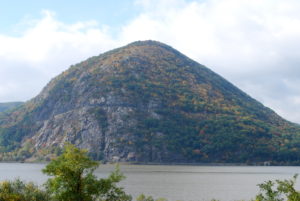
Storm King Mountain — rare glimpse without a storm at the top
“The Island arrived in its current position, and the battle against the Heer ensued. The Heer is a dangerous and potent enemy. He had many allies and more than one domicile. He had halls in both Storm King and in Dunderberg—Thunder Mountain—some twenty miles south. This battle raged, on and off with interruptions, for almost two decades, culminating in the death of Grand Inquisitor Bannerman, when Bannerman’s Castle exploded under the onslaught of the Heer and his lightning imps. But thanks to Ben Franklin’s great-granddaughter, the Heer was snared.
“To this day, the Unwary believe that the castle was a weapons arsenal, and that this is why it exploded. Mundane history books claim that Francis Bannerman was an arms dealer. That much was true. He did own a mighty arsenal of weapons both mundane and arcane—but this is not why his castle exploded.
“In the midst of all this, however, something else happened in nineteen oh seven. As many of you know, Roanoke Island and Brendan’s Island—which is actually situated on the back of an unusually large and sluggish whale—were the only earthly places where the crew of the Flying Dutchman could step. At a ball on All-Hallow’s Eve, the captain of that cursed vessel fell in love with a young Roanokean girl. When she was still loyal to him seven years later, it broke the curse that had caused his ship to eternally wander.
“Alas, the spell that kept Roanoke afloat also ended. When the tutors and Wisecraft gathered to recast the spell to move the island, they found that the original settlers had not recorded what Laughing Spirit taught them. Nor could they find any remaining Croatan Indians able to tell them how the island-moving spell was accomplished.
“So Roanoke found itself stranded in a rather dangerous area. Many brutes and beasties live in the Hudson Highlands, including the Heer, whom they had not yet trapped.There were also the lightning imps; the mist sprites; the storm witch Mother Kronk; the Mexaxkuk, a native horned serpent that supped on human flesh, which dwelt on the old Pollepel Island against which Roanoke had moored; and a family of water panthers living in the river. Not to mention the Headless Horseman, who rides up from the south on All Hallows’ Eve.
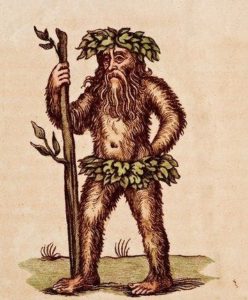
A Woodwose — one of the resident fey on the floating island of Roanoke
“On top of that, Roanoke has gathered its own collection of supernatural nasties over the years, the price of visiting so many foreign lands. There are the water leapers who now live on the small islands just beyond the east cove; the woodwose in the southern forest outside the wards; the wight by the standing stones; the each-uisge and Wilis in the marshes. Redcaps in the forest. Trow in the valley north of the tor, and a phooka in the meadow beyond that. Spruce trolls on the tor’s slopes, not to mention dozens of mischievous fey who make their home on the island. Oh, and, of course, in the cave in the cliffs by Dutchman’s Cove, the ogre who has caused such grief of late.”
Mr. Tuck leaned forward and wagged a finger at the audience. “This is why we emphasize that students should stay inside the wards. The outside island can be very dangerous.”
For a moment, Rachel thought he was looking directly at her. Her heart skipped a beat. But he was not, and she breathed more easily. The lawyerly portion of her brain noted, with relief, that he had said “should stay,” not “must stay.”
Beside her, Siggy murmured to Lucky and Seth, “Ace! Let’s go out after this and see if we can find some of those woses and eek-uglies!”
“Once we captured the Heer, we discovered that, so long as we kept him locked up here, all the rest of the supernatural baddies left us alone—because they were afraid of the Heer. Thus, an agreement was arranged between the island and the local supernatural beings, which we call the Roanoke Covenant.” Mr. Tuck paused and puffed out his cheeks. “Unfortunately, this agreement is only good for a year and a day once the Heer escapes. Last time, we caught him within the allotted time. Fortune willing, we will do so again.”
“In orchestrating this agreement, known as the Roanoke Compact, we were aided by one who knew the local native spirits. You may have noticed all the parkland near us: Storm King State Park to our west, the Hudson Highlands to our east, Fahnestock State Park beyond that, and the Shawangunks farther north. Even today, unknown to the Unwary, there is a Lenni Lenape tribe of the Wise living in these areas. Their medicine man came to help with the negotiations between the fey and Roanoke Island, and he stayed. In fact, he is still here to this day.”
An image of Nighthawk, Roanoke’s Master Warder, appeared on the screen. The Lenni Lenape man looked younger than he had when Rachel met him, but he had the same hawklike nose and formidable bearing.
“Three of Nighthawk’s grandchildren attend our school today, I believe. Dirk, Glaive, and Kris Wright? Have I forgotten anyone?”
Three students stood up. To Rachel’s surprise, one of them was the pink-haired girl from De Vere. All three had Asian features. They looked more like Laurel and Peter than like their American Indian grandfather.
Kris Serenity Wright, the outspoken, pink-haired De Vere girl, stepped forward. She waved to the audience in the quick, graceful way that she did everything. “Hi! We’re the Wrights. Our father is Master Warder Nighthawk’s son. Our mother is Katana the Kitsune. We’re honored to be here at this school that still continues to exist, despite all odds, because of how awesome our grandda is. He’s the one you have to thank for the fact that we don’t all get skewered in our beds by red caps or eaten by the ogre!”
Mr. Tuck nodded pleasantly. “And that concludes our little trip down memory lane. Some mysteries have been solved. Others remain a mystery. Before we depart to prepare for feasting, so that we may eat until we are so stuffed that they will be required to roll us back to our beds, are there any questions? Problems? Major dilemmas?”
Students raised their hands, asking for clarifications about various points. One student asked about the other three sorcerers who gave their names to Roanoke dormitories. Mr. Tuck explained that when the island went to England in eighteen twenty four, Raleigh, De Vere, Drake and Spenser, who were all still alive, visited the island and bequeathed libraries to the school—though that was the last public appearance Drake ever made, as he vanished two months later, en route to Russia while carrying an important missive. Only Kit Marlowe never actually set foot here, having been killed in a tavern brawl in fifteen ninety three. Marlowe Hall was named for him as a memorial.
Another student called out, “If some of these fey creatures are so terrible—like the woodwose, the ogre, and the wight—why don’t we kill them?”
Mr. Tuck shook his head. “Can’t. That’s part of the compact. So long as we don’t kill them—except when directly attacked—they agree not to kill us, except when we stray into their territory. And since, when they feel unconstrained, they often begin with the hapless Unwary, who know nothing of them and cannot defend themselves, it is our responsibility to see that compacts such as this one do not get broken. That is why it is imperative that we recapture the Heer. The Wisecraft is hard at work on that matter. Yes, next? Miss Wright?”

Bannerman’s Castle on Bannerman Island
Kris Serenity Wright jumped to her feet again, her pink hair bobbing. “Also, charmed life! Some of the baddies, like the ogre and the woodwose have charmed lives. That’s why they weren’t already killed long, long ago. And—before you who grew up among the Unwary start bragging about your big weapons—” She turned and stuck her tongue out at her Unwary-born roommate. “It’s been tried. As Mr. Tuck said, Grand Inquisitor Bannerman was an arms dealer. He shot the ogre with a machine gun, a flame thrower, and an anti-aircraft weapon. Oh, and he tried a landmine. Back then, no one had better ordnance than Bannerman.”
“Thank you, Miss Wright. Anyone else?”
When Mr. Tuck first asked for questions, Siggy’s hand had shot up, waving back and forth. Each time Mr. Tuck did not pick him, he waved it more vigorously. Eventually, his was the only hand still waving.
Mr. Tuck looked left and right and then sighed. “Courtesy requires that I call upon you, Mr. Smith, but experience suggests that such a course of action is a chancy venture at best. Please, surprise me.”
“What did the Terrible Five want with Roanoke?” Sigfried called, rising to his feet.
Mr. Tuck looked pleasantly surprised and mildly relieved. “That is another mystery, Mr. Smith, that we can add to our collection. No one knows.
“One reason may have been that, other than the Scryory at Casan—the capital of Prester John’s kingdom—and the Academy on Mount Hua, in China, Roanoke was the last bastion of truly powerful sorcerers. The Terrible Years had begun with the slaying of the entire staff of the Wisecraft, including Herodotus Powers, the Grand Inquisitor of that era, Bannerman’s successor. The great sorcerers of India had fallen at Mohenjo Daro. Those of Europe had been slain at the Battle of Ittoqqortoormiit, in Ultima Thule, and those of America at the Battle of Detroit.
“So part of the purpose of the Terrible Five was to complete the defeat their opposition. But if that had been their only goal, however, they would not have bothered to hold the school—which required keeping order among over two thousand student hostages. And yes, the school was much bigger in those days.
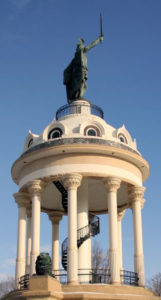
Memorial of Taleisin the Brave, near the shrines
“No, all five of them and their crony, Aaron Marley, were clearly searching for something. They left gouges all over the island, where they had dug up the ground. You may have noticed how some portions of the memorial gardens are new? The Terrible Five dug up the former shrine garden.
“And they released the Heer, of course—some of you know about the historic battle between the storm goblin and our head of security, Maverick Badger? But the Terrible Five kept searching after that, so the Heer was not their ultimate target, either.
“What they were looking for, however, we never did determine. Perhaps, they found it. Perhaps not. Most likely, we shall never know. Some mysteries remain mysterious.”
See The Unexpected Enlightenment of Rachel Griffin on Amazon
*

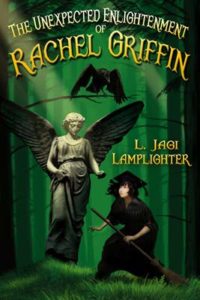
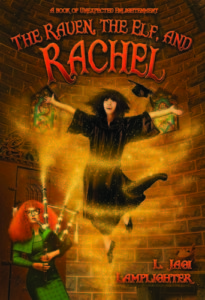
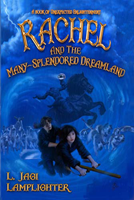

Leave a comment